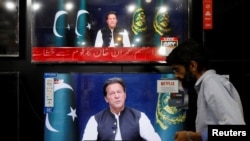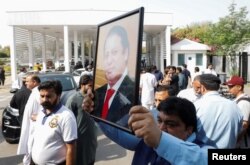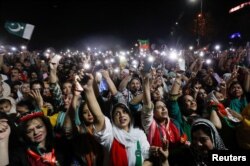Pakistan's Supreme Court adjourned until Wednesday a hearing to decide the legality of Prime Minister Imran Khan's blocking of an opposition bid to oust him, a dispute that has led to political turmoil in the nuclear-armed country.
Former cricket star Khan lost his parliamentary majority last week and had been facing a no-confidence vote tabled by a united opposition that he was expected to lose on Sunday.
But the deputy speaker of parliament, a member of Khan's party, threw out the motion, ruling it was part of a foreign conspiracy and unconstitutional. Khan then dissolved parliament.
The stand-off has thrown the country of 220 million people, ruled by the military for extended periods since independence in 1947, into a full-blown constitutional crisis.
The opposition challenged Khan's decision in a legal case in the Supreme Court that began on Monday.
The panel of five judges has not said when it might give a ruling.
"Our concern is about the legality of the ruling of the speaker," Chief Justice Umar Ata Bandial said at the hearing. "We don't want to indulge in policy matters."
Opposition lawyer Makhdoom Ali Khan said Khan's actions were a violation of the constitution.
"This is not just a matter of procedure but it is in negation of parliamentary democracy," he told the court.
The hearing was adjourned on Tuesday after legal arguments against the move were concluded. The court will hear from Khan's team on Wednesday.
The court could order that parliament be reconstituted, call for a new election or bar Khan from standing again if he is found to have acted unconstitutionally. Read full story
The court could also decide that it cannot intervene in parliamentary affairs.
Lengthy legal proceedings would create a power vacuum with implications for issues such as talks with the International Monetary Fund to secure funds to support the cash-strapped economy.
No evidence of plot
Political chaos would also worry the powerful military, which has stepped in to remove civilian governments and rule on three occasions, citing the need to end political uncertainty.
The turmoil also threatens to damage ties with long-time ally the United States, after Khan accused it of being behind the plot to overthrow him.
The United States dismissed the accusation.
Pakistan's security agencies have not found credible evidence to confirm Khan's complaint of a foreign conspiracy, an official with knowledge of the matter, who declined to be identified, told Reuters.
Khan and the deputy speaker had said Pakistan's National Security Committee, a top panel that groups civilian officials as well as the military and intelligence chiefs, had confirmed a plot to overthrow him.
However, the official, who is privy to such proceedings, said the security agencies had not come to the same conclusion as Khan and had communicated their view to him.
Khan, who was for years critical of the U.S. involvement in Afghanistan, also accused opposition parties of being part of a foreign conspiracy.
Shehbaz Sharif, the opposition candidate likely to replace Khan as prime minister should the court rule against Khan, told media that he had urged army and intelligence chiefs to look into Khan's accusation.
Political analysts say the military viewed Khan and his conservative agenda favorably when he won a general election in 2018 but the generals' support has since waned.
Khan denied ever having the backing of the military and the military says it has no involvement in the political process.







